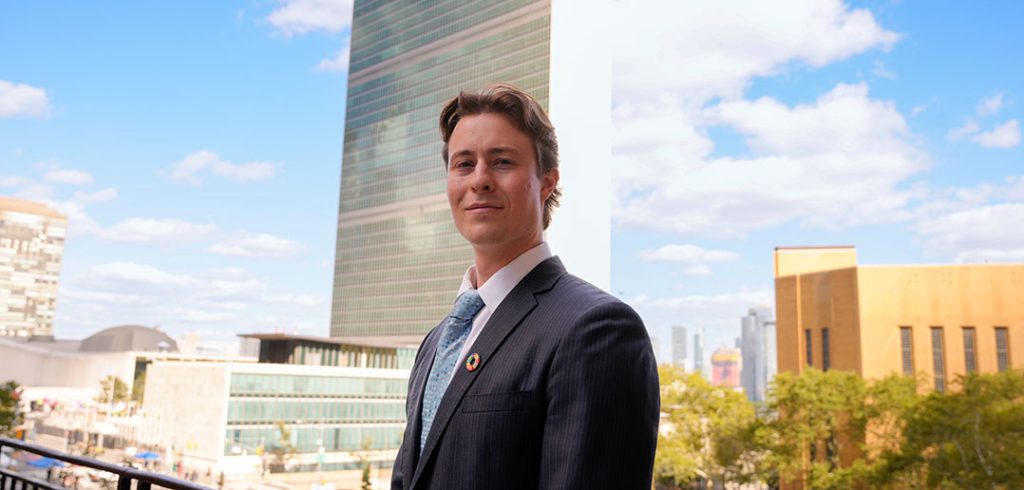A U.N. communications officer and analyst helps farmers adapt to climate change
Chicago native Ian Muir Smith got his first meaningful exposure to the effects of climate change in 2021, as a Fordham College at Lincoln Center student majoring in international studies.
He earned a summer research grant to travel to Kenya, where he spent three months studying how farmers are using technology to mobilize resources and “guide their own development,” he says. He lived in an adobe hut with no running water and watched his hosts’ water reserves run out because of a drought.
“That was the context of everything that was happening in people’s lives,” he says.
Toward a More Just Model of Agricultural Development
The farmers Smith lived with in Kenya are among nearly 4.5 billion people who rely on food systems for their livelihood, according to the United Nations’ Department of Economic and Social Affairs. It’s a statistic that lies at the heart of Smith’s work as a consultant for the U.N.’s International Fund for Agricultural Development (IFAD) and as a research fellow for the nonprofit Food Tank.
“In order for countries to ‘develop,’ agriculture is the first thing that has to change,” Smith says, noting that agriculture is also responsible for one third of global greenhouse gasses contributing to climate change. “And whether they get to determine how to do it, or whether other countries and companies are determining how they do it, is up in the air. I want to make agriculture and agricultural development more just and more democratic.”
As a communications and knowledge management consultant with IFAD, which is an international financial institution and specialized United Nations agency, Smith looks over data from the portfolio of grants that the agency sends to research institutions to help smallholder farmers adapt to climate change. He then writes reports and blog posts on the effects those grants had. These are made available in the agency’s “knowledge base,” a database that is publicly available and sent to partners and donors.
Working to Ensure That Climate Debt Gets Paid
By the time his final semester rolled around, he had the opportunity to take a communications internship with the United Nations in Rome, where IFAD is headquartered, beginning his professional relationship with the agency and furthering his passion for steering developmental resources to those most impacted by industrialization and climate change.
“The reason that I want to do what I want to do,” he explains, “is that I truly believe the U.S. and Europe owe a debt to the billions of people who are suffering because of the climate crisis and neo-imperialism. And I want to spend my life making sure that debt is paid.”
Since graduating, Smith has helped organize several youth climate actions and is currently working to start a microfinancing social enterprise to invest in women’s communal banking groups in Kenya. And while food system and climate issues can often result in a sort of “doom and gloom” feeling, Smith says that his work has made him feel more optimistic about meeting the challenge.
“Every day I learn about new organizations doing new work that is changing people’s lives,” he says. “There are millions and millions of people who are working on food systems and are determined to make the world better.”
Read more “20 in Their 20s” profiles.


